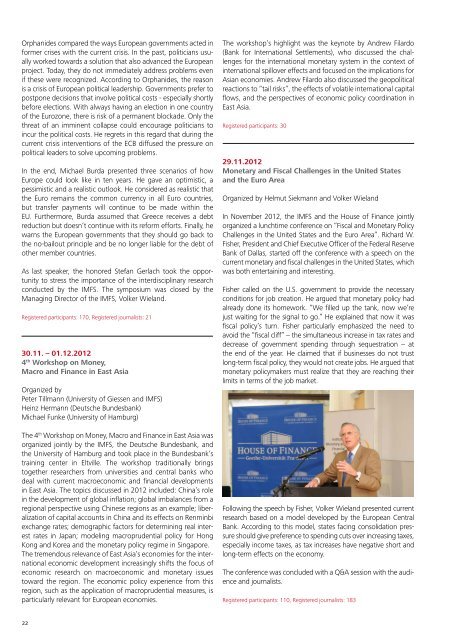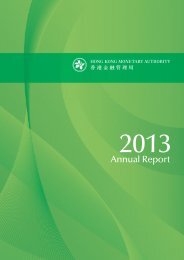IMFS_2009_to_2013_web
IMFS_2009_to_2013_web
IMFS_2009_to_2013_web
Create successful ePaper yourself
Turn your PDF publications into a flip-book with our unique Google optimized e-Paper software.
Orphanides compared the ways European governments acted in<br />
former crises with the current crisis. In the past, politicians usually<br />
worked <strong>to</strong>wards a solution that also advanced the European<br />
project. Today, they do not immediately address problems even<br />
if these were recognized. According <strong>to</strong> Orphanides, the reason<br />
is a crisis of European political leadership. Governments prefer <strong>to</strong><br />
postpone decisions that involve political costs - especially shortly<br />
before elections. With always having an election in one country<br />
of the Eurozone, there is risk of a permanent blockade. Only the<br />
threat of an imminent collapse could encourage politicians <strong>to</strong><br />
incur the political costs. He regrets in this regard that during the<br />
current crisis interventions of the ECB diffused the pressure on<br />
political leaders <strong>to</strong> solve upcoming problems.<br />
In the end, Michael Burda presented three scenarios of how<br />
Europe could look like in ten years. He gave an optimistic, a<br />
pessimistic and a realistic outlook. He considered as realistic that<br />
the Euro remains the common currency in all Euro countries,<br />
but transfer payments will continue <strong>to</strong> be made within the<br />
EU. Furthermore, Burda assumed that Greece receives a debt<br />
reduction but doesn’t continue with its reform efforts. Finally, he<br />
warns the European governments that they should go back <strong>to</strong><br />
the no-bailout principle and be no longer liable for the debt of<br />
other member countries.<br />
As last speaker, the honored Stefan Gerlach <strong>to</strong>ok the opportunity<br />
<strong>to</strong> stress the importance of the interdisciplinary research<br />
conducted by the <strong>IMFS</strong>. The symposium was closed by the<br />
Managing Direc<strong>to</strong>r of the <strong>IMFS</strong>, Volker Wieland.<br />
Registered participants: 170, Registered journalists: 21<br />
30.11. – 01.12.2012<br />
4 th Workshop on Money,<br />
Macro and Finance in East Asia<br />
Organized by<br />
Peter Tillmann (University of Giessen and <strong>IMFS</strong>)<br />
Heinz Hermann (Deutsche Bundesbank)<br />
Michael Funke (University of Hamburg)<br />
The 4 th Workshop on Money, Macro and Finance in East Asia was<br />
organized jointly by the <strong>IMFS</strong>, the Deutsche Bundesbank, and<br />
the University of Hamburg and <strong>to</strong>ok place in the Bundesbank’s<br />
training center in Eltville. The workshop traditionally brings<br />
<strong>to</strong>gether researchers from universities and central banks who<br />
deal with current macroeconomic and financial developments<br />
in East Asia. The <strong>to</strong>pics discussed in 2012 included: China’s role<br />
in the development of global inflation; global imbalances from a<br />
regional perspective using Chinese regions as an example; liberalization<br />
of capital accounts in China and its effects on Renminbi<br />
exchange rates; demographic fac<strong>to</strong>rs for determining real interest<br />
rates in Japan; modeling macroprudential policy for Hong<br />
Kong and Korea and the monetary policy regime in Singapore.<br />
The tremendous relevance of East Asia’s economies for the international<br />
economic development increasingly shifts the focus of<br />
economic research on macroeconomic and monetary issues<br />
<strong>to</strong>ward the region. The economic policy experience from this<br />
region, such as the application of macroprudential measures, is<br />
particularly relevant for European economies.<br />
The workshop’s highlight was the keynote by Andrew Filardo<br />
(Bank for International Settlements), who discussed the challenges<br />
for the international monetary system in the context of<br />
international spillover effects and focused on the implications for<br />
Asian economies. Andrew Filardo also discussed the geopolitical<br />
reactions <strong>to</strong> “tail risks”, the effects of volatile international capital<br />
flows, and the perspectives of economic policy coordination in<br />
East Asia.<br />
Registered participants: 30<br />
29.11.2012<br />
Monetary and Fiscal Challenges in the United States<br />
and the Euro Area<br />
Organized by Helmut Siekmann and Volker Wieland<br />
In November 2012, the <strong>IMFS</strong> and the House of Finance jointly<br />
organized a lunchtime conference on “Fiscal and Monetary Policy<br />
Challenges in the United States and the Euro Area”. Richard W.<br />
Fisher, President and Chief Executive Officer of the Federal Reserve<br />
Bank of Dallas, started off the conference with a speech on the<br />
current monetary and fiscal challenges in the United States, which<br />
was both entertaining and interesting.<br />
Fisher called on the U.S. government <strong>to</strong> provide the necessary<br />
conditions for job creation. He argued that monetary policy had<br />
already done its homework. “We filled up the tank, now we’re<br />
just waiting for the signal <strong>to</strong> go.” He explained that now it was<br />
fiscal policy’s turn. Fisher particularly emphasized the need <strong>to</strong><br />
avoid the “fiscal cliff” – the simultaneous increase in tax rates and<br />
decrease of government spending through sequestration – at<br />
the end of the year. He claimed that if businesses do not trust<br />
long-term fiscal policy, they would not create jobs. He argued that<br />
monetary policymakers must realize that they are reaching their<br />
limits in terms of the job market.<br />
Following the speech by Fisher, Volker Wieland presented current<br />
research based on a model developed by the European Central<br />
Bank. According <strong>to</strong> this model, states facing consolidation pressure<br />
should give preference <strong>to</strong> spending cuts over increasing taxes,<br />
especially income taxes, as tax increases have negative short and<br />
long-term effects on the economy.<br />
The conference was concluded with a Q&A session with the audience<br />
and journalists.<br />
Registered participants: 110, Registered journalists: 183<br />
22



